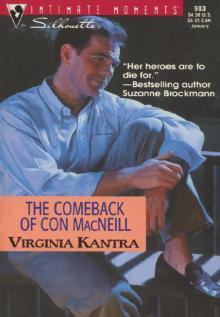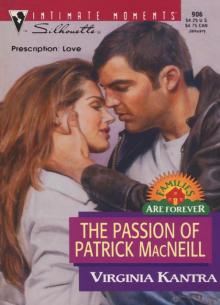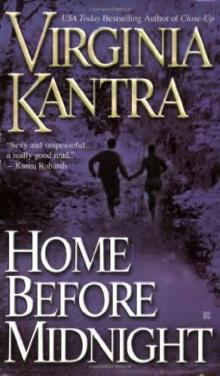- Home
- Virginia Kantra
Sea Fever Page 5
Sea Fever Read online
Page 5
This summer for some reason had been worse. Maybe because Nick was old enough now to chafe at his mother’s restrictions. Regina rubbed the headache brewing between her eyebrows. She ought to be able to sympathize with that.
“Nick,” she called.
He was silent. Sulking? She’d been short with him this morning.
Distracted, Regina thought guiltily, trying hard not to remember Saturday night, Dylan’s hands on her hips as he moved slickly, thickly inside her.
No sex on the beach was as important as her son.
“Nicky?”
The restaurant cat, Hercules, meowed plaintively from the top of the stairs.
No answer.
Worry trickled through her. On World’s End, everybody knew everybody’s business. Every neighbor kept an eye on every child. Children here still walked to the store alone, still played on the beach unsupervised.
But she’d told Nick and told him not to leave the restaurant without telling her. There were dangers on the island, too, tides and fog and gravel pits, teenagers in cars, strangers with haunted eyes . . .
Regina shook her head. She was not letting herself get spooked because some homeless guy had wandered into the restaurant looking for work and a sandwich.
Knowing she was overreacting, however, didn’t keep her palms from sweating, didn’t stop her heart from hammering in her chest. When you were a single mom, there was nobody to share the worry or the blame, and so the worry doubled and every danger assumed terrifying proportions. Anything could threaten this tiny person who had been entrusted to you, your baby, your son, the best and most inconvenient thing that had ever happened to you, and it would all be your fault because you hadn’t been taking care, you hadn’t wanted him in the first place.
Regina forced herself to release her grip on the stair railing. Okay, definitely overreacting now.
She opened the unlocked door to their apartment, Hercules darting between her ankles into the empty living room.
“Nick?” She cocked her head, listening for the sound of the television, the gurgle of water from the bathroom.
But he was gone.
4
NICK BARONE EYED THE LITTLE BLUE SKIFF hauled up on the rocks with longing. He could take it out. He was old enough; he could handle it.
And if he went out on the water alone, his mom would probably kill him.
She was already mad. Not with him. With Nonna. Nick had heard them arguing, his grandmother’s raised voice, his mother’s low tones. The sound made his stomach hurt until he couldn’t stand it, couldn’t stand being cooped up in the boring apartment with nothing to do but listen to the two people he loved best in the world fighting with each other.
So he got out.
Nick hugged his knees and stared at the flat, bright water, waiting for his stomach to settle. His best friend, Danny Trujillo, was sterning on his dad’s lobster boat, so Nick couldn’t hang out at his house, and a bunch of summer people had taken over Nick’s favorite sitting-and-thinkingspot. He watched them: a couple of moms and a half-dozen kids, from almost his age to a baby.
No dads. Probably the dads were fishing. Or maybe they worked on the mainland and joined their families on the weekends. Nick’s father worked on the mainland, but he never came on weekends. Or ever.
Nick kicked at the rocks and wondered if his mom and Nonna were still fighting. Probably not. Their fights never lasted long, but sometimes for hours afterward his grandmother would be grumpy and his mom’s face was all stiff. Nick’s stomach tightened just thinking about it.
After a while, the summer people packed up their lotions and towels and hunted for their shoes, and Nick had the beach to himself.
There was a sailboat coming in, bigger than the little sunfish Nick had learned to sail, almost too big for the one man Nick could see on deck. The sailor didn’t look like he was having trouble, though, even with both sails up. And that was another weird thing, those full sails, because there wasn’t any wind where Nick stood.
The boat slid past the orange buoys that marked shallow water. Too fast, Nick thought. Too far. He opened his mouth to yell a warning, but then the sails collapsed like a big old gum bubble and the boat just stopped. Nick had never seen anything like it. He watched as the guy in the boat— he was tall, with long, dark hair— secured the lines and dropped anchor. The splash slapped the sides of his boat.
The guy looked at the distance between his boat and the beach and then at Nick. With a slight shrug, the man stepped off the boat and into water up to his wiener.
Nick giggled. He couldn’t help it. Man, oh, man, that must be cold.
The guy tossed back his wet hair and looked right at him.
Nick covered his mouth with his hand.
But instead of getting mad, the man grinned, too, a real grin, guy to guy. He sloshed toward shore.
Nick held his ground and waited to see what the dude would do next.
He came out of the sea, water streaming from his shorts and squishing in his shoes.
“You could have rowed a dinghy,” Nick said. “From your boat.”
“I could.”
Nick couldn’t tell from the man’s voice if he was agreeing or asking a question.
He sat on a rock to take off his shoes. Ordinary boat shoes, curled at the seams from repeated wettings. He emptied the water from one and wriggled his toes back inside.
Nick frowned. Something about the man’s toes . . .
He jammed his other foot into wet leather.
“Or you could have tied up in the harbor,” Nick said.
The man grunted and stood. He was very tall and not very old, for a grown-up. “I am looking for someone.”
Nick’s heart jumped and slammed into his ribs, because it was the sort of thing he used to imagine his father might say if his father ever showed up looking for him. It was a dumb dream; Nick knew it would never happen. His father didn’t care about him.
Besides, Nick knew what his father, his real father, looked like. He was on TV, for cripe’s sake. Nick used to tell people that, but then they asked him stuff, and Nick didn’t know anything about his father, not really. But he knew what he looked like. He didn’t look anything like this guy.
Still, Nick’s mouth was dry as he asked, “Who?”
“A woman.”
Nick swallowed. Okay. He hadn’t really figured— He hadn’t actually hoped— “What’s her name?”
The man’s dark eyes went blank. “Her name.” Some of Nick’s disappointment escaped in exasperation. “She has to have a name.”
“She cooks,” the man said. “She cooked for a wedding.”
His mom. Nick stuck out his chin. This guy was looking for his mother. “Were you at the wedding?”
“Yes.” The man looked him over and then offered, “I am Caleb’s brother.”
Nick’s shoulders relaxed. That was okay, then. Chief Hunter was totally cool. He came into the restaurant all the time. Sometimes he let Nick play with his handcuffs.
“That’s my mom,” he said. “She cooks.”
The man’s eyes narrowed. “Your mother.”
Jeez. Did he have to repeat everything?
“Yeah. Regina Barone.”
“Where is your father?”
Nick sighed. Sometimes he wished his father was dead. No, that wasn’t right. Sometimes he wished his parents were divorced, like normal kids’ parents, so he didn’t have to explain them.
“In Boston.” His father’s restaurant was in Boston.
“We left him.” Years and years ago, when Nick was a baby.
“Ah.” The man’s eyes were real dark, pupil and iris together, like a dog’s.
“I am Dylan,” the man said, using his first name like an islander would, not “Mr.,” like most grown-ups from Away.
“Nick.” He stuck out his hand, the way his mom said you should.
The guy looked at his hand a moment, and then he shook. His hand was dry and warm.
“Will you take
me to your mother?” Dylan asked.
* * *
“Nick’s not here,” Brenda Trujillo said over the phone. “He called, but Manuel took Danny out on the boat today.”
Regina took a deep breath, trying not to panic. “When?”
“I don’t know. Early this morning, five or—”
“No, I meant, when did Nick call?”
“Oh.” A long pause. “Is everything all right? You sound—”
“Everything’s fine,” Regina said through her teeth. “What time did you talk to Nick?”
“An hour ago?” Brenda guessed. “Two? It’s not like I was looking at my watch, I—”
“Okay, thanks. If you see him, will you let me know? Or if he calls again—”
“I told him not to call until after five.”
Regina was silent.
“It’s not my job to keep track of everybody else’s children,” Brenda said defensively.
Regina gripped the receiver as if she could throttle Brenda through the phone. “I’m not asking you to watch him. Just to call me.”
“Well, of course I will, but—”
“Thanks,” Regina said and hung up the kitchen phone.
She rubbed the cross around her neck, threading it back and forth along the chain, struggling to focus. Nick had the same freedom she did at his age. Living on an island, you knew which houses were safe and which ones to stay away from. Even the summer people— most of them— were known quantities, returning year after year.
Of course, it was only a month ago that Bruce Whit-taker went off his nut and murdered some poor stranger on the beach. Bad things could happen, even on an island. But at least Nick couldn’t get lost, couldn’t run away, could never go more than three miles from home.
Unless he took a boat.
Some of his older friends, ten- and twelve-year-olds, already had their own outboard skiffs; ran their own lobster lines.
And swiped their mothers’ cigarettes and their fathers’ beer, Regina thought grimly, but she didn’t think her son was vulnerable to those temptations yet. He wanted a boat, though. He wasn’t supposed to go out on the water without telling her. But then, he wasn’t supposed to leave the house without telling her either. The ball of worry in her gut formed a hard lump.
“I’m calling Cal,” she said.
Her mother looked up from shucking clams for the night’s dinner service. The restaurant served shellfish only two ways, steamed or fried. At the moment, Regina couldn’t bring herself to care.
“Why?” Antonia asked.
“To keep an eye out for Nick.”
“Nick’s fine. Leave the boy alone. Leave them both alone.” She shot a glance at Margred, refilling salt and pepper shakers on the other side of the pass-through, and lowered her voice. “Caleb’s married now.”
Regina flushed. She hadn’t thought her crush was that obvious. Bad enough that on the island everybody knew everybody’s business. She’d prefer to keep her feelings private. Who else had observed or guessed she was carrying a torch for the chief? Cal himself?
She winced. Margred?
She opened her mouth to say something, anything, when the bell over the door jangled and they walked in.
Nick. Relief rushed to her head, making her dizzy.
And Dylan.
Another wave of emotion hit her, just as hard and not nearly as clear as the first.
She wasn’t going to see him again. Everything she’d done that night, everything they’d done, was based on that certainty. He was leaving, he’d said. He hadn’t even asked for her phone number. The bastard.
Setting her jaw, she pushed through the swinging door. “Where have you been?” she demanded.
“The beach. I met this guy.” Nick flashed her a hopeful smile, as if he’d brought home a handful of shells for her instead of a potential disaster. “He says he knows you.”
Dylan smiled, showing the edge of his teeth. He looked different by daylight, harder, more threatening. “Hello, Regina.”
At least he remembered her name.
She glared at him, betrayed by circumstances and the leap of her own pulse. “I thought you left.”
“And now I am back.”
She crossed her arms, aware of her mother’s sharp look from the other side of the pass-through, of Margred’s frank interest. “What do you want?”
“I haven’t decided,” Dylan said silkily. “What are you offering?”
Her breath hissed through her teeth. If he stuck around, she was going to have to kill him. And then possibly herself.
But she had Nick to deal with first.
“You’re too late for lunch. Dinner specials are on the chalkboard. You.” She jabbed her finger at Nick. “Upstairs. We have to talk.”
“It’s always trouble when they say that,” Dylan murmured.
Nick grinned.
“You shut up,” Regina said. The last thing she needed was her one-time beach hookup coaching her son in irresponsible behavior. She jerked her head toward the kitchen door. “Upstairs,” she repeated.
“Aren’t you glad to see me?” Dylan inquired.
Regina’s stomach lurched. She scowled. “Not particularly.”
“You’re Bart’s boy,” Antonia announced suddenly. “The older one. What are you doing here?”
“Yes, Dylan, what are you doing here?” Margred asked.
Regina’s headache had grown until her neck wobbled with the weight of it. For eight long years, she’d lived like a damn nun. Eight years of silencing the gossips, of living down her past mistakes. One lousy screwup in eight years, and it followed her home like a puppy.
He followed her home.
Life was so unfair.
Dylan smiled into Regina’s eyes, arrogant and confident and cool. “Exploring the local . . . attractions.”
“Go explore someplace else,” she said. “I’m working.”
“There’s no need to be embarrassed,” he said softly.
Antonia’s eyes narrowed. “Why should she be embarrassed?”
Regina ground her teeth together. “I am not embarrassed. I’m busy.”
Dylan looked around the empty restaurant; raised one eyebrow. “I can wait.”
“You’ll wait a long time.” She ruffled her son’s hair, ignoring a pang when he ducked from her touch. “Come on, Nick.”
“I’ll come back, then,” Dylan said.
Their eyes clashed. His were very dark. She felt a catch in her chest like a hiccup while her mind blanked with lust. That was bad. She needed to breathe, she needed to think, and she couldn’t do either while he watched her with those dark, unsmiling eyes.
“Whatever,” she said, dismissing him. “It’s been real.”
Too real, she thought as she escaped upstairs to lecture Nick about house rules and responsibility.
She’d liked Dylan better when he was a fantasy.
* * *
Like a fantasy, Dylan continued to haunt her, popping up at inconvenient moments, distracting her from her work.
He dropped by the restaurant every day for a whole damn week, wanting things: a cup of coffee, a few words with Margred, a sandwich. Never at the same time, so Regina could brace herself against the little fizzle she felt each time she saw him, so she could find something else to do in the back.
Besides, she refused to be chased around her own damn restaurant. Her mother’s restaurant.
She could take care of herself. She was eighteen when she ran away to Boston, fresh meat to the wait staff who were always hungover, horny, or high. She’d learned to ignore the busboys’ liquid looks and comments in Spanish, to use her elbows and once a boning knife when she’d been crowded against the stove or cornered in the walk-in refrigerator.
Dylan didn’t touch her. He barely spoke to her. Regina wondered if he came to see her at all or if he was really sniffing around his sister-in-law. That thought didn’t sit well with Regina for a variety of reasons.
But it wasn’t Margred he watched.
/>

 Meg and Jo
Meg and Jo All a Man Can Do
All a Man Can Do THE COMEBACK OF CON MACNEILL
THE COMEBACK OF CON MACNEILL All a Man Can Be
All a Man Can Be MAD DOG AND ANNIE
MAD DOG AND ANNIE![Dare Island [2] Carolina Girl Read online](http://i1.bookreadfree.com/i/03/26/dare_island_2_carolina_girl_preview.jpg) Dare Island [2] Carolina Girl
Dare Island [2] Carolina Girl Forgotten Sea
Forgotten Sea Sea Lord
Sea Lord THE PASSION OF PARICK MACNEILL
THE PASSION OF PARICK MACNEILL All a Man Can Ask
All a Man Can Ask Home Before Midnight
Home Before Midnight Family Secrets: Books 5-8
Family Secrets: Books 5-8 Carolina Dreaming: A Dare Island Novel
Carolina Dreaming: A Dare Island Novel Carolina Home
Carolina Home GUILTY SECRETS
GUILTY SECRETS Carolina Blues
Carolina Blues Carolina Man
Carolina Man Carolina Man (A Dare Island Novel)
Carolina Man (A Dare Island Novel) STOLEN MEMORY
STOLEN MEMORY Carolina Heart
Carolina Heart Immortal Sea
Immortal Sea THE TEMPTATION OF SEAN MCNEILL
THE TEMPTATION OF SEAN MCNEILL Sea Fever
Sea Fever